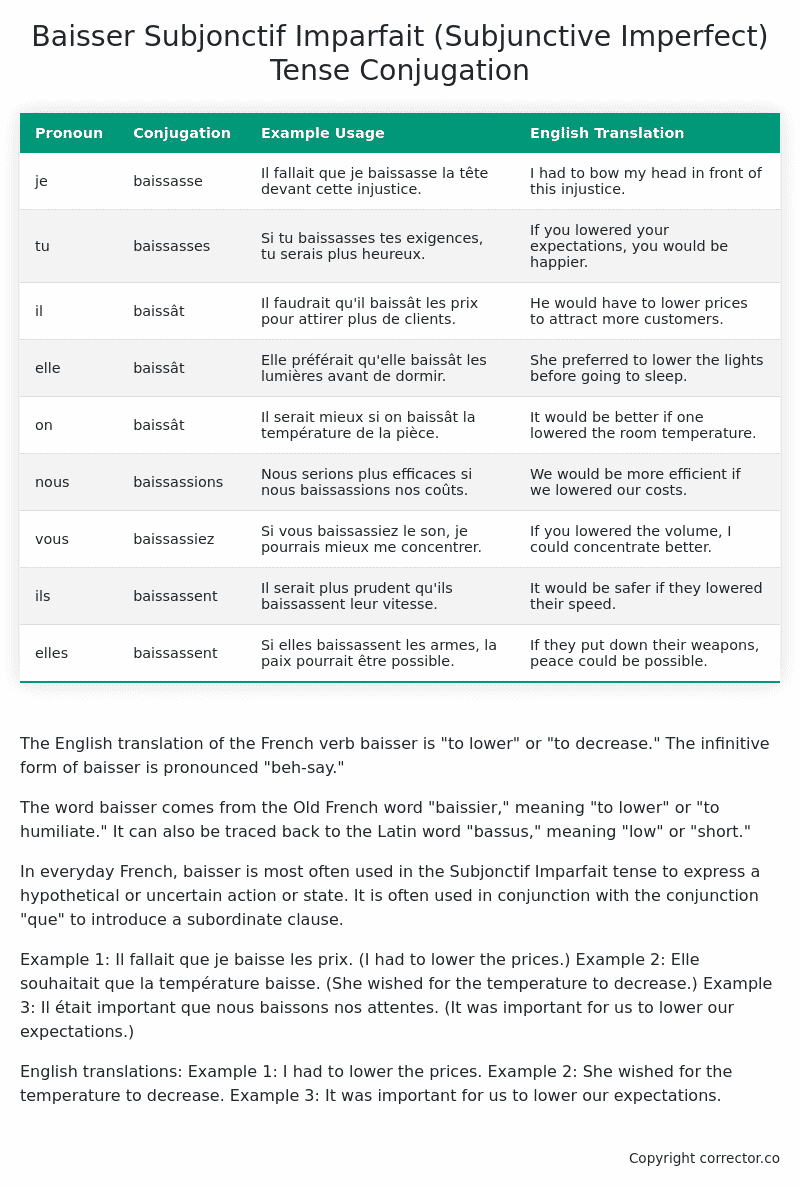Subjonctif Imparfait (Subjunctive Imperfect) Tense Conjugation of the French Verb baisser
Introduction to the verb baisser
The English translation of the French verb baisser is “to lower” or “to decrease.” The infinitive form of baisser is pronounced “beh-say.”
The word baisser comes from the Old French word “baissier,” meaning “to lower” or “to humiliate.” It can also be traced back to the Latin word “bassus,” meaning “low” or “short.”
In everyday French, baisser is most often used in the Subjonctif Imparfait tense to express a hypothetical or uncertain action or state. It is often used in conjunction with the conjunction “que” to introduce a subordinate clause.
Example 1: Il fallait que je baisse les prix. (I had to lower the prices.)
Example 2: Elle souhaitait que la température baisse. (She wished for the temperature to decrease.)
Example 3: Il était important que nous baissons nos attentes. (It was important for us to lower our expectations.)
English translations:
Example 1: I had to lower the prices.
Example 2: She wished for the temperature to decrease.
Example 3: It was important for us to lower our expectations.
Table of the Subjonctif Imparfait (Subjunctive Imperfect) Tense Conjugation of baisser
| Pronoun | Conjugation | Example Usage | English Translation |
|---|---|---|---|
| je | baissasse | Il fallait que je baissasse la tête devant cette injustice. | I had to bow my head in front of this injustice. |
| tu | baissasses | Si tu baissasses tes exigences, tu serais plus heureux. | If you lowered your expectations, you would be happier. |
| il | baissât | Il faudrait qu’il baissât les prix pour attirer plus de clients. | He would have to lower prices to attract more customers. |
| elle | baissât | Elle préférait qu’elle baissât les lumières avant de dormir. | She preferred to lower the lights before going to sleep. |
| on | baissât | Il serait mieux si on baissât la température de la pièce. | It would be better if one lowered the room temperature. |
| nous | baissassions | Nous serions plus efficaces si nous baissassions nos coûts. | We would be more efficient if we lowered our costs. |
| vous | baissassiez | Si vous baissassiez le son, je pourrais mieux me concentrer. | If you lowered the volume, I could concentrate better. |
| ils | baissassent | Il serait plus prudent qu’ils baissassent leur vitesse. | It would be safer if they lowered their speed. |
| elles | baissassent | Si elles baissassent les armes, la paix pourrait être possible. | If they put down their weapons, peace could be possible. |
Other Conjugations for Baisser.
Le Present (Present Tense) Conjugation of the French Verb baisser
Imparfait (Imperfect) Tense Conjugation of the French Verb baisser
Passé Simple (Simple Past) Tense Conjugation of the French Verb baisser
Passé Composé (Present Perfect) Tense Conjugation of the French Verb baisser
Futur Simple (Simple Future) Tense Conjugation of the French Verb baisser
Futur Proche (Near Future) Tense Conjugation of the French Verb baisser
Plus-que-parfait (Pluperfect) Tense Conjugation of the French Verb baisser
Passé Antérieur (Past Anterior) Tense Conjugation of the French Verb baisser
Futur Antérieur (Future Anterior) Tense Conjugation of the French Verb baisser
Subjonctif Présent (Subjunctive Present) Tense Conjugation of the French Verb baisser
Subjonctif Passé (Subjunctive Past) Tense Conjugation of the French Verb baisser
Subjonctif Imparfait (Subjunctive Imperfect) Tense Conjugation of the French Verb baisser (this article)
Subjonctif Plus-que-parfait (Subjunctive Pluperfect) Tense Conjugation of the French Verb baisser
Conditionnel Présent (Conditional Present) Tense Conjugation of the French Verb baisser
Conditionnel Passé (Conditional Past) Tense Conjugation of the French Verb baisser
L’impératif Présent (Imperative Present) Tense Conjugation of the French Verb baisser
L’infinitif Présent (Infinitive Present) Tense Conjugation of the French Verb baisser
Struggling with French verbs or the language in general? Why not use our free French Grammar Checker – no registration required!
Get a FREE Download Study Sheet of this Conjugation 🔥
Simply right click the image below, click “save image” and get your free reference for the baisser Subjonctif Imparfait tense conjugation!

Baisser – About the French Subjonctif Imparfait (Subjunctive Imperfect) Tense
Formation
Common Everyday Usage Patterns
Interactions with Other Tenses
Subjonctif Présent
Indicatif Passé Composé
Conditional
Conditional Perfect
Summary
I hope you enjoyed this article on the verb baisser. Still in a learning mood? Check out another TOTALLY random French verb conjugation!


